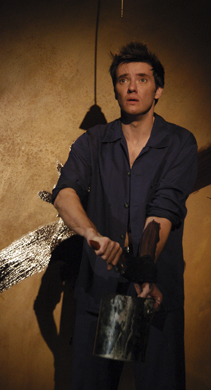
|
HAMLET
|
|
|
|
HAMLET
Fresh Prince: Something’s Different in the State of Denmark as DTC Makes Over “Hamlet” By Lawson Taitte / The Dallas Morning News Purists beware. The Dallas Theater Center wants Hamlet to grab the audiences. It is not treating Shakespeare’s tragedy like some sacred cow. Richard Hamburger has always been among the most literary of stage directors. After all, his father wrote for The New Yorker. But while the Theater Center’s artistic director wants this production to be faithful to the spirit of the Bard, he’s willing to do some violence to the letter of the text. Just how much will be evident when Hamlet opens Tuesday night. “In my head, I have this committee of people I respect most. I want them to be excited and to see the play anew when they see this production,” Mr. Hamburger says. “We’re not trying to be different, and this is not meant to be a conceptual production,” he says. “We’re just trying to find our own way into it. I’ve done quite a lot of research and read a lot, but it [research] becomes an excuse not to work on the play.” Another of Dallas’ most thoughtful directors, Undermain Theatre’s Katherine Owens, emphasizes how long the process of preparation can be. “When you do these great plays like Hamlet or King Lear, you do your preparation for years,” she says. “Things keep coming in.” “This is a version of Hamlet,” Mr. Hamburger says of his first directorial encounter with the most revered of tragedies. He says he hopes it won’t be his last. YOUTH APPEAL Mr. Hamburger’s ideas this time around make the younger characters, especially, easily recognizable to a contemporary audience. “I see Hamlet and Ophelia as two young, brilliant people – trend-setting outsiders,” Mr. Hamburger says. “They’re black sheep next to Laertes, who today might be an investment banker who plays polo and knows the Bushes. I want young people to come to this and see one of their own.” But not in their own time. Although the set and costumes aren’t very time-specific, he imagines the action in pre-World War I Europe. “This is the world of Freud and Mahler and Schoenberg,” Mr. Hamburger says. “Hamlet is almost like an expressionist artist before his time, while the members of the court are more old-fashioned.” In this Hamlet, even the dialogue might be vastly different from the next time Mr. Hamburger tackles the play. For months this summer, he and retired Southern Methodist University professor Margaret Loft met repeatedly to cut and shape the text. To arrive at a running time of around 2 hours, more than a third of the lines had to go. “This is a totally different animal from any other play of its time,” says Ms. Loft. “It’s like a different form of a Woody Allen movie – everything is going on in Hamlet’s mind. The subjectivity, the ‘interiority’ influenced the entire mind of Europe.” The goal of their dialogue shaping was to hold the audience’s attention. “Every time you get a line they don’t understand, another door is shut,” says Ms. Loft. She describes herself as “the slasher,” saying that Mr. Hamburger “just resisted and resisted” cutting favorite bits. For a couple of days, a Cold War frosted their relationship. But finally, any line that playgoers could not be expected to understand was out. The director and his text consultant weren’t afraid even to change the language if need be, to make sure that the intention, as they understood it, gets across. “It’s strong, lean,” Ms. Loft says. “It flows.” POINT OF VIEW Mr. Hamburger has compiled a record as a strong-willed interpreter of Shakespeare. His first stab at the Bard for the Theater Center was 1997’s All’s Well That Ends Well. Boldly, Mr. Hamburger had his actors play the ending twice, once straight and once ironically, to convey the tragicomedy’s profound ambiguity. Ms. Loft hints that something similar is going on in this Hamlet. “The end is a complete departure,” she says. “The play is a deep soul search on the part of Hamlet about what makes a leader and how a man lives his life. Every time we hear him, he’s comparing himself to somebody else.” Obviously, to a very great extent Hamlet is Hamlet’s show. The director chose New York actor Jason Butler Harner to play his hero. “I see this as a total collaboration,” Mr. Hamburger says, and Mr. Harner agrees that the director relies on input from all the actors. “Of course, from me more than most,” Mr. Harner says, “because I have so many lines. But Richard loves an argument. There are these knockdown bouts where you check on the logicality of what the character is saying and doing.” During rehearsals, Mr. Harner says, he was especially focused on getting the audience involved emotionally. “I don’t remember seeing a production of Hamlet where we really cared about what this one man is going through or what this family is suffering,” he says. “One thing for sure about this production, though – it’s going to be sexy.” Mr. Hamburger is bullish about his star. “Jason is brilliant,” he says. “He has a great physical sense of the stage and an edgy sense of irony.” What about the director’s sense of his own work? “I’m trying to get across Hamlet’s kaleidoscopic personality, and I’m not sure I’m there yet,” Mr. Hamburger says. “You get caught up in the exigencies of putting up a show...but there’s a texture in there....” Hamlet, of course, isn’t the only intelligent guy who can’t make up his mind. |
|
© Richard Hamburger, Theater Director Site design and maintenance by Amy Lacy.
|



